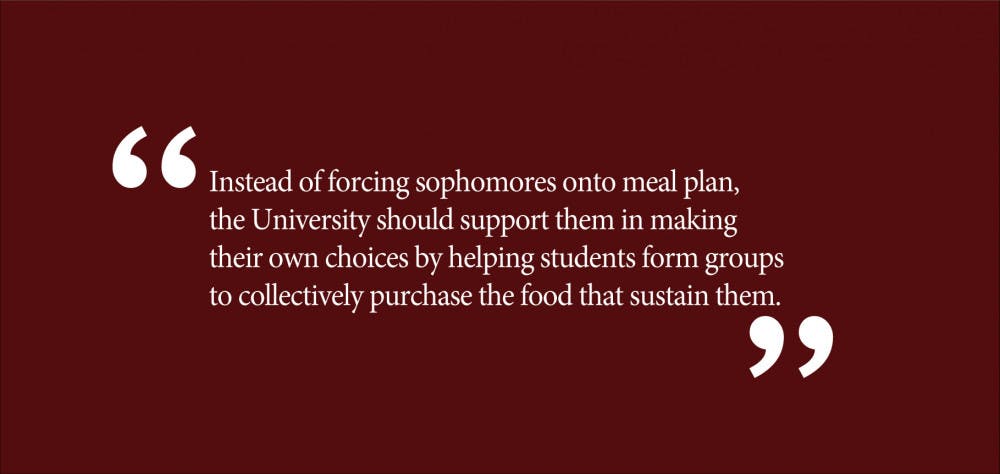The University’s new policy requiring sophomores to enroll in a meal plan has taken a lot of heat — and rightly so. After a long process of evaluating food security at Brown, the University ultimately reduced food options rather than deciding to help students make healthy choices. There are a number of alternatives to a sophomore meal plan requirement that Brown may pursue, but an investment supporting student food cooperatives represents an especially promising option, as it would promote community-building for students in addition to improving food security.
A food cooperative is a group that collectively purchases food and distributes that food to its members. These cooperatives can be as large or as small as desired. If you and your suitemates all chip in to buy a big bag of rice and then share that bag, that is an example of cooperative food sharing on a small scale. You may already have heard of food co-ops that function as member-driven alternatives to grocery stores, and these are certainly a type of food cooperative. But the gentrifying boutique stores that sell overpriced organic food are not the type of food cooperative I’m talking about here. I’m suggesting that Brown should support its students in creating small to mid-size cooperatives that promote food security for students off meal plan.
Successful food cooperatives already exist on campus, providing students with both a community and reliable access to quality food at an extremely affordable price. I know because I have benefited from one such co-op. As a sophomore, I opted to go off meal plan. To feed myself, I joined the food co-op at the Environmental Program House, which is just one of the multiple food co-ops at Brown. As one of 24 members, I cooked or cleaned an average of once per week, and had unlimited access to as much food as I could eat. Over the course of the semester, I made new friends over meals and acquired cooking skills. I learned to look forward to nights when our most skilled chefs were cooking. Sometimes I would arrive for dinner and find delicious curry dishes with rice or huge pastas, salads and freshly baked dessert. I always left full, both in body and soul.
And I was saving money. Because we bought in bulk and shared the costs, I paid only $550 per semester — far below the cost of meal plan. And because all members shared the labor, my time commitment was only an hour or two per week.
Since becoming a student who lives and eats off-campus, I have only become more convinced of the effectiveness of food cooperatives. Living in my own apartment, I want to be able to cook in my own kitchen, and I don’t want to pay an arm and a leg. Instead of continuing as a member of the Environmental Program House food co-op, I share groceries with my housemates and cook on my own. Some students take this method to the next level by teaming up to order food through Farm Fresh Rhode Island. Farm Fresh delivers in Rhode Island for all orders over $100, so students in a team of ten can order online and receive a week’s worth of produce and local goods like cheese and eggs for only $10 per week. Where such models are already in place, it’s easy to coordinate shared meals and hangouts in addition to weekly grocery pick-ups.
Savvy students have figured this out. They take advantage of options like Farm Fresh RI. But Brown can do more to make collective food purchasing accessible to all students by creating a platform where interested students can find the necessary information and form their own groups. For many students, there are two barriers: first, knowledge of food purchasing options and second, finding the right group of people with which to collectively purchase food. The University has already taken a few commendable steps to expand food purchasing options for students. It expanded its OnCall shuttle service to East Side Marketplace, Stop & Shop and Walmart, and it promoted student discounts on the grocery delivery service Peapod. In addition, the Brown Market Shares program — though not always the cheapest option — offers weekly produce, bread, dairy and eggs to students who invest in a share. But these services would make a greater impact when combined with collective purchasing options. The new Peapod service, for example, requires students to spend a minimum of $60 on their groceries to qualify for delivery, which makes the option inaccessible to many. If, in addition, Brown were to provide a platform through which a few students could join forces to put in an order together, that $60 mark would become much less of a barrier.
Brown should explain all the food purchasing options available to students on one centralized platform. On that platform, students should be able to indicate their interest in teaming up with others to collectively order food. Students would be able to connect and decide whether collective purchasing makes sense based on where they live, what they like to eat and other related factors. When students find the right group, they would be able set up a recurring order to provide them with reliable weekly food. They can decide on a group cooking schedule, if desired. Though this may sound complex, it really just requires finding a group and setting up a recurring order online. If Brown supports its students in this process, fewer students would struggle with food insecurity. As an added benefit, students would have expanded opportunities to build community. If the University is to address food insecurity at Brown, helping students form food co-ops will serve the Brown community better than a blanket sophomore meal plan requirement.
Students are dissatisfied with the changes that the University made to its meal plan requirements. As an open letter in protest of the changes stated shortly after the University announced the new requirement, “Many rising sophomores, who have been expecting the option to leave the university meal plan, have been completely blindsided… and are scrambling to change personal plans… or gather funds to cover this unexpected expense.” That letter is signed by over 700 students.
I know that for me, the moments of deepest connection with my peers have come when sharing meals that we prepared together. It is a shame that the University took that option away from a full quarter of Brown’s undergraduate population. Instead of forcing sophomores onto meal plan, the University should support them in making their own choices by helping students form groups to collectively purchase the food that sustains them.
Asher Lehrer-Small ’20 can be reached at asher_lehrer-small@brown.edu. Please send responses to this opinion to letters@browndailyherald.com and op-eds to opinions@browndailyherald.com.





